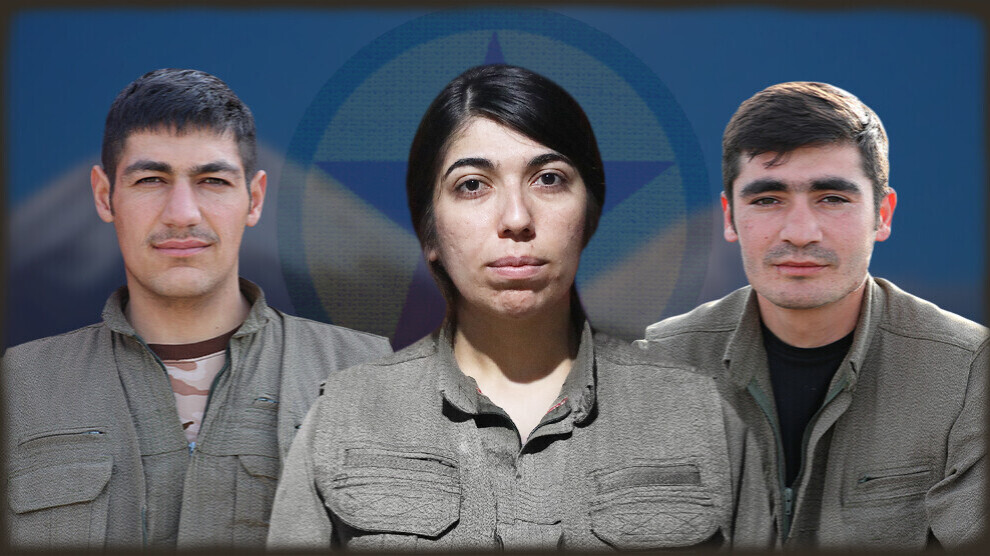HPG pays tribute to guerrillas Agirî Azadî, Serxwebûn Rêvan and Harun Cûdî
Guerrillas Agirî Azadî from Rojava, Serxwebûn Rêvan from Bakur and Harun Cûdî from Rojhilat fell martyrs in an attack by the Turkish army last October.
Guerrillas Agirî Azadî from Rojava, Serxwebûn Rêvan from Bakur and Harun Cûdî from Rojhilat fell martyrs in an attack by the Turkish army last October.

The press center of the People's Defense Forces (HPG) announced the deaths of three guerrillas in the northern Kurdish Serhed region. In a statement, the HPG wrote: "Our companions Agirî, Serxwebûn and Harun were valuable apoist militants. It has been confirmed that they fell in an enemy attack in the Kirê Halaç area of Gilîdax on 5 October 2023."
The fallen fighters had joined the liberation struggle from various parts of Kurdistan, and the HPG described them as a symbol of Kurdish unity: "They made the collective values of the PKK the basis of their lives and fought with great enthusiasm and certainty of victory even under the most difficult conditions. With their lives and their deaths as martyrs, they will continue to lead us as their companions. We bow to their legacy with respect and gratitude and express our condolences to their precious families and the patriotic people of Kurdistan."
The HPG provided the following information on the identity and biographies of the martyrs:
 Code name: Agirî Azadî
Code name: Agirî Azadî
First and last name: Ferha Hacî
Place of birth: Girkê Legê
Names of mother and father: Ferha - Ekrem
Date and place of death: October 5, 2023 / Serhed
 Code name: Serxwebûn Rêvan
Code name: Serxwebûn Rêvan
First and last name: Suat Özel
Place of birth: Mûş
Names of mother and father: Hediye - Yusuf
Date and place of death: October 5, 2023 / Serhed
 Code name: Harun Cûdî
Code name: Harun Cûdî
First and last name: Mecîd Delayîmîlan
Place of birth: Makû
Names of mother and father: Çînî – Yusuf
Date and place of death: October 5, 2023 / Serhed
Agirî Azadî
Agirî Azadî was born in Girkê Legê and came from Rojava. She grew up aware of her Kurdish identity and heard about the PKK's struggle as a child. However, she only got to know the Kurdish freedom movement during the Rojava revolution. Impressed by the idea of free coexistence of all population groups, she took part in social activities and studied Abdullah Öcalan's analysis on the subject of women's liberation.
She became aware of the role assigned to women in society and followed the defensive struggle against the Islamist attacks on Rojava with great admiration. In order to participate in the defense of the revolution and at the same time break the chains of patriarchal enslavement, she joined the armed resistance in Rojava and joined the guerrilla in the mountains in 2016. There she built on her previous experience in military and ideological struggle and, after basic training, began to train other new fighters herself. After two years, she went to a military academy and took part in a training program for women in guerrilla warfare. In order to prepare for a deployment in Northern Kurdistan, she studied military tactics and ideological content intensively. One focus was on the women's liberation ideology, her role model being the combative life of Sakine Cansız (Sara). She then fought as a determined militant of the YJA Star in Serhed.
Serxwebûn Rêvan
Serxwebûn Rêvan came from Bakur and was born in Milazgir in the province of Mûş. He grew up in an environment close to the Kurdish freedom movement, and his childhood was marked by the repression of the Turkish state. After his father died, he began to work to support his family.
Affected by the ISIS attack on Kobanê in 2014 and the brutal suppression of the resistance for self-government in Northern Kurdistan in the following years, Serxwebûn tried several times to join the armed resistance. His first attempts failed, but in Serhed he was finally able to join the guerrillas. There he fought with great determination until the end.
Harûn Cûdî
Harûn Cûdî came from Rojhilat and was born in Qeleniyê. He grew up aware of his Kurdish identity and the colonial division of his country and was interested in the liberation struggle from an early age. Because he knew that thousands of young people were fighting for freedom in the mountains, he also wanted to contribute.
When he first encountered a guerrilla group and saw their attitude to life, he was happy and proud and wanted to join immediately. He was too young for that, and later attempts also failed. Instead, he had to go to military service in the Iranian army. Military service was unbearable for him; he experienced the degradation and mistreatment of Kurds by commanders and deserted. His further path led him to the guerrillas in the mountains. He underwent basic training and finally came to Gilîdax, where he fought for his ideals to the end.